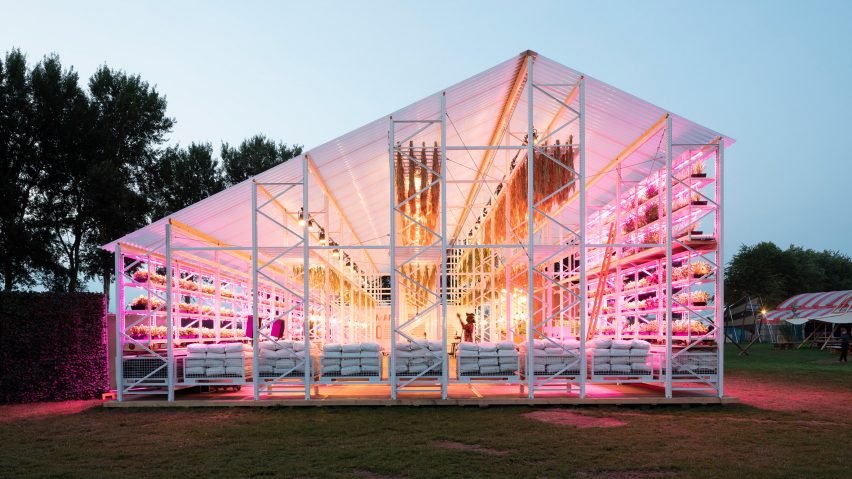Overtreders W has built a temporary barn from borrowed materials to host a pop-up zero waste restaurant at the Lowlands Festival in the Netherlands.
The pop-up restaurant – named Brasserie 2050 – was created for catering company The Food Line Up for the festival, which took place 17-19 August 2018.
Imagining what the world will need to eat to support its predicted population of 10 billion in 2050, the concept restaurant served up a sustainable menu, which included "no waste" bread baked from potato peelings and pesto made from kitchen leftovers.
Overtreders W, which specialises in temporary structures, built the "barn of the future" for the eatery, using borrowed, hired standard construction materials that would keep their value after the pavilion was dismantled at the end of the festival.
"A barn is a timeless icon for farming, and has proven itself over the centuries as a neutral but recognisable envelope in which evolving farming activities can take place," the architects said.
"When you see a barn, you know you're in a farming area. In the future the barn will keep on adapting itself to new ways of breeding and harvesting."
Creating no waste, the temporary structure was designed to have no ecological footprint to demonstrate what closed loop architecture can look like.
Standard pallet racks were used to form most of the long rectangular building, with a gabled roof made from white corrugated plastic.
Vertical farming cabinets planted with herb boxes formed the open facade of the pavilion, with crates filled with sacks of grain acting as ballast.
Bunches of wheat, corn, onions and garlic were suspended from the rafters as storage-cum-decoration above trestle tables and benches made from recycled plastic.
Last year Overtreders W collaborated with Bureau SLA to create a structure from borrowed wood and recycled plastic for the People's Pavilion at Dutch Design Week.
Inspired to design for closed loop systems, Danish studio EFFEKT has created a concept village that could produce all its own food and energy using greenhouses and solar panels, and Toronto studio Lateral Office developed a campsite model where campers could enjoy the wilderness sustainably.
Photography by Jorn van Eck.

